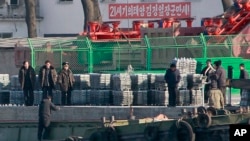After President Donald Trump last week issued a new executive order giving the United States greater leverage over foreign banks that support the North Korean regime, the U.S. is now looking at implementing the tougher sanctions, officials said Thursday.
Susan Thornton, acting assistant secretary of state for Asian and Pacific affairs, told a congressional committee the administration is working with allied countries to try and “ferret out these illicit underground networks” used by North Korea to subvert previous sanctions.
“We’re working with international partners,” she said. “And I think continuing a full court press with those international partners on implementation is going to be the key to really upping the pressure on the Kim [Jong Un] regime.”
The U.S. Treasury Department announced new sanctions Tuesday targeting eight North Korean banks, as well as 26 DPRK banking officials. The Treasury Department said the action aimed to prevent North Korea from using the international financial system to facilitate its missile programs.
Sigal Mandelker, treasury undersecretary for terrorism and financial crimes, told Congress the executive order marked the first time in more than a decade that a non-North Korean bank had been targeted for facilitating North Korean financial activity. She specifically mentioned the China-based Bank of Dandong.
“Banks worldwide should take note,” she said.
Earlier this month, the U.N. Security Council adopted a new round of economic sanctions against North Korea following Pyongyang's testing of what may have been a hydrogen bomb.
If fully implemented, the new sanctions would cut one-third of North Korea's oil imports, and reduce by more than half the country's gas, diesel and heavy fuel oil imports, while completely banning the import of natural gas and other oil substitutes.
North Korea condemned the U.N. action, calling it a "full-scale economic blockade" that was aimed at "completely suffocating" the North Korean people.
The 26 North Korean nationals sanctioned Tuesday by the U.S. live abroad, but they work for North Korean banks. Nineteen are living in China, three are based in Russia, and two each are living in Libya and the United Arab Emirates.





